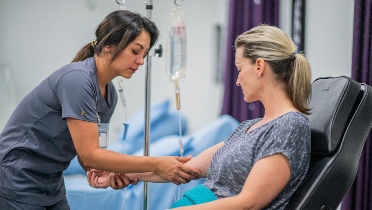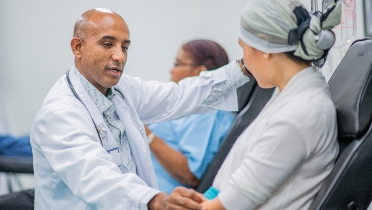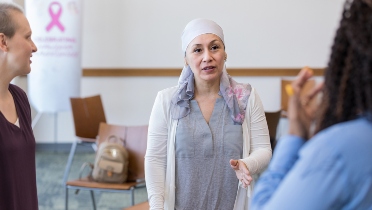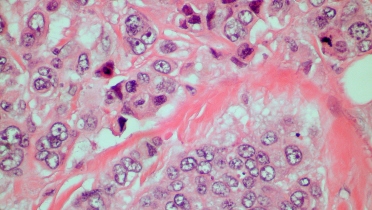Loading the player...
Neratinib + Capecitabine Improves QoL for HER2+ Metastatic Breast Cancer
For patients diagnosed with HER2+ metastatic breast cancer, newer targeted therapies have made a significant difference in how doctors can treat them.
A recent study looked at the impact of one of these new combination therapies and how it impacts not only overall survival but also health-related quality of life.
Results of the NALA study, which included more than 600 patients from 28 countries, were presented at the 2020 San Antonio Breast Cancer Symposium.
During the trial, patients were randomized to receive either neratinib and capecitabine or lapatinib and capecitabine.
Lead author Beverly Moy, MD, MPH, an associate professor of Medicine at Harvard Medical School and clinical director of breast oncology at Massachusetts General Hospital, told MD/alert that despite progress made in the field, the treatment of metastatic HER2+ positive breast cancer still presents several challenges.
"Patients ultimately do succumb to the disease due to resistance mechanisms and often actually develop other diseases in the brain and places that are a little bit more challenging to treat. Given that we have new treatment options, we really wanted to look at the quality of a patient’s life on different therapies for metastatic breast cancer," Beverly Moy, MD, MPH, said in an interview.
Health-related quality of life was measured every six weeks until the end of treatment with a mean completion rate of the QLQ-C30 of 91% in both arms.
At baseline, the mean QLQ-C30 summary score was 79.8 in the neratinib arm and 79.9 in the lapatinib arm. After 19 treatment cycles, the summary scores were 81.8 and 81.3, respectively.
The researchers noted discontinuation due to any treatment-emergent adverse event was lower in the neratinib arm.
Dr Moy said for doctors treating women with this condition, two of the most important factors to consider are overall survival and quality of life, two areas she said were addressed in this research.
One area of concern the researchers did have with the treatment is the potential for an increased risk of diarrhea. Moy said despite that, the patients reported a high quality of life and stayed on the treatment.
She said there are several likely factors contributed to the high quality of life score for the newly approved treatment.
"Certainly, this is an all-oral regimen, right. It’s a pill. So, you don’t have to come into the hospital as frequently for IVs, which is really nice," Dr. Moy added. "You know, basically, it offers patients a little bit more freedom, and it makes their treatment somewhat less of a burden for them. But really, the side effects are very manageable. So, people took these medications and had some side effects, but it doesn’t really impair how they went from their day-to-day. That’s really an important goal for women with metastatic breast cancer because the goal, obviously, is to find a treatment that’s effective. But since they have to be on something chronically, or long term, you want that treatment to be well tolerated."
Dr Moy explained that with new treatments being developed and with the progress already made in the field, she is encouraged by what providers can do to help their patients live longer lives than they could just a few years ago.
"It used to be when women were diagnosed with metastatic HER2+ breast cancer prior to the development of all these amazing HER2 directed therapies women didn’t have long survivals. Maybe it was in the order of, you know, two to three years," she continued. "But now we’re seeing women live five years or longer with the advent of these new targeted therapies that are so effective. But we still obviously have a long way to go. And we are, you know, we want that to be even better."
By Adam Hochron
A recent study looked at the impact of one of these new combination therapies and how it impacts not only overall survival but also health-related quality of life.
Results of the NALA study, which included more than 600 patients from 28 countries, were presented at the 2020 San Antonio Breast Cancer Symposium.
During the trial, patients were randomized to receive either neratinib and capecitabine or lapatinib and capecitabine.
Lead author Beverly Moy, MD, MPH, an associate professor of Medicine at Harvard Medical School and clinical director of breast oncology at Massachusetts General Hospital, told MD/alert that despite progress made in the field, the treatment of metastatic HER2+ positive breast cancer still presents several challenges.
"Patients ultimately do succumb to the disease due to resistance mechanisms and often actually develop other diseases in the brain and places that are a little bit more challenging to treat. Given that we have new treatment options, we really wanted to look at the quality of a patient’s life on different therapies for metastatic breast cancer," Beverly Moy, MD, MPH, said in an interview.
Health-related quality of life was measured every six weeks until the end of treatment with a mean completion rate of the QLQ-C30 of 91% in both arms.
At baseline, the mean QLQ-C30 summary score was 79.8 in the neratinib arm and 79.9 in the lapatinib arm. After 19 treatment cycles, the summary scores were 81.8 and 81.3, respectively.
The researchers noted discontinuation due to any treatment-emergent adverse event was lower in the neratinib arm.
Dr Moy said for doctors treating women with this condition, two of the most important factors to consider are overall survival and quality of life, two areas she said were addressed in this research.
One area of concern the researchers did have with the treatment is the potential for an increased risk of diarrhea. Moy said despite that, the patients reported a high quality of life and stayed on the treatment.
She said there are several likely factors contributed to the high quality of life score for the newly approved treatment.
"Certainly, this is an all-oral regimen, right. It’s a pill. So, you don’t have to come into the hospital as frequently for IVs, which is really nice," Dr. Moy added. "You know, basically, it offers patients a little bit more freedom, and it makes their treatment somewhat less of a burden for them. But really, the side effects are very manageable. So, people took these medications and had some side effects, but it doesn’t really impair how they went from their day-to-day. That’s really an important goal for women with metastatic breast cancer because the goal, obviously, is to find a treatment that’s effective. But since they have to be on something chronically, or long term, you want that treatment to be well tolerated."
Dr Moy explained that with new treatments being developed and with the progress already made in the field, she is encouraged by what providers can do to help their patients live longer lives than they could just a few years ago.
"It used to be when women were diagnosed with metastatic HER2+ breast cancer prior to the development of all these amazing HER2 directed therapies women didn’t have long survivals. Maybe it was in the order of, you know, two to three years," she continued. "But now we’re seeing women live five years or longer with the advent of these new targeted therapies that are so effective. But we still obviously have a long way to go. And we are, you know, we want that to be even better."
By Adam Hochron
















.jpg)
.jpg)


.jpg)
.jpg)
.jpg)
.jpg)
.jpg)
.jpg)
.jpg)
.jpg)
.jpg)

.jpg)
.jpg)
.jpg)
.jpg)

.jpg)

.jpg)
.jpg)
.jpg)

.jpg)

.jpg)


.jpg)
.jpg)
.jpg)
.jpg)

.jpg)



.jpg)
.jpg)
.jpg)

.jpg)

.jpg)
.jpg)

.jpg)
.jpg)


.jpg)
.jpg)
.jpg)

.jpg)
.jpg)
.jpg)
.jpg)
.jpg)
.jpg)
.jpg)
.jpg)
.jpg)
.jpg)
.jpg)
.jpg)
.jpg)

.jpg)
.jpg)

.jpg)

.jpg)
.jpg)


.jpg)

.jpg)
.jpg)

.jpg)
.jpg)
.jpg)
.jpg)
.jpg)
.jpg)
.jpg)
.jpg)
.jpg)
.jpg)

.jpg)
.jpg)




.jpg)
.jpg)
.jpg)
.jpg)
.jpg)
.jpg)
.jpg)
_.jpg)
.jpg)
.jpg)
.jpg)
 Featured Breast Cancer Videos
Featured Breast Cancer Videos.jpg)